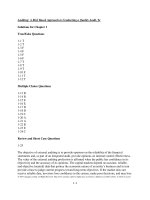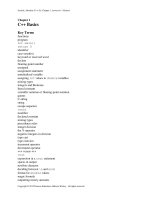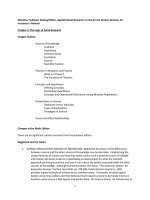Test bank and solution manual marketing research process and systems for decision making (2)
Bạn đang xem bản rút gọn của tài liệu. Xem và tải ngay bản đầy đủ của tài liệu tại đây (111.58 KB, 1 trang )
Exercise 1.
Go to:
Read the article "Driving Buyers to the Web." Evaluate the "test marketing" of Ford Motor
Company regarding quoting prices on line. What is the intended impact of this new marketing
approach by Ford? What impact might it have on consumer behavior?
Solution:
The article describes new marketing strategies using the Internet to attract customers back to
the showrooms. Carmakers worried about losing ground to online middlemen are developing
their own Web programs. Some dealers aren't happy. With a range of new Internet initiatives
and pilot programs, auto manufacturers are evening out the playing field between dealers and
customers; doing everything from revealing inventory figures and other trade secrets to
promising buyers they won't have to talk to a salesman until the last possible moment. In test
markets, Ford has even begun to quote prices online, putting the squeeze on dealers to
cooperate with a new breed of informed and assertive consumer.
Exercise 2.
Go to: . You are employed by Kraft Foods as a marketing research
analyst trying to determine the market potential for your packaged Swiss Cheese product. You
are interested in determining whether or not people may use your product in a fairly saturated
cheese market. How would you determine whether or not your ad campaign would lead to the
use of your product?
Solution:
The article provides empirical support for copy testing use intention As markets become more
saturated, increasing usage becomes much more important that convincing new customers to
choose your brand. The problem is, current copy testing methods aren't effective at measuring
usage intentions. How can copy testing be modified to capture usage related responses?
Two studies of 303 adults showed that measuring usage likelihood ("how likely are you to eat
soup in the next 2 weeks?") and estimating usage volume ("how many cans of soup will you
eat in the next 2 weeks?") were both effective in predicting usage levels. It was also shown
that volume predictions were much more effective in heavy users, while likelihood estimates
worked better for light users. Study 2 showed a procedure that increased the effectiveness of
copy tests without biasing the results.
Exercise 3.
You are engaged in marketing research that is focused on the market segment of people who
commute over 44 minutes to work. Specifically, you are interested in targeting the states that
contain the largest percentage of those who commute this distance. Which states would you
select for your research? (Hint: go to: ) and select the appropriate
commuting category in the drop down menu for population characteristics.
Solution:
Students should select the category Commute over 44 minutes %. The map generated by the
Census data, will reflect the relative percentage of those commuting this distance. The states
that hold the highest concentrations of 44+ minute commuters are: California, Texas, New
York, Georgia, Massachusetts, Virginia, Illinois, and New Jersey.









